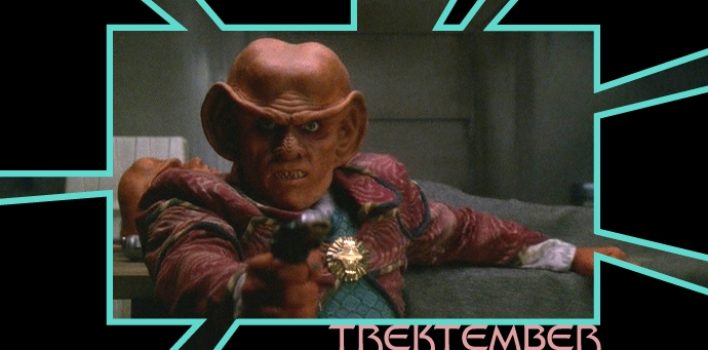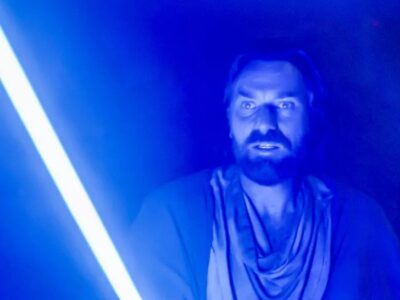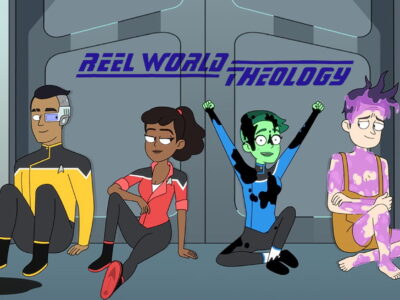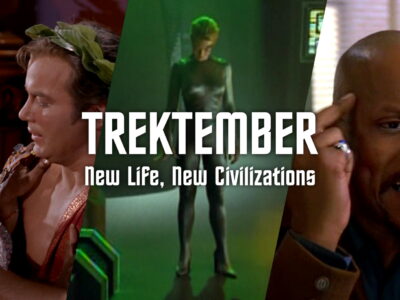Trektember: The Seige of AR-558
Quark: Let me tell you something about hew-mons, nephew. They’re a wonderful, friendly people as long as their bellies are full and their holosuites are working. But take away their creature comforts, deprive them of food, sleep, sonic showers, put their lives in jeopardy over an extended period of time and those same friendly, intelligent, wonderful people… will become as nasty and as violent as the most bloodthirsty Klingon.
If there’s one thing you can say about the Ferengi, it’s that they’ll always get down to the brass “tax.” They are perhaps the most greedy, self-absorbed race in the galaxy, yet they also happen to be one of the most astute observers of the hew-mon heart. To be expected, I suppose, from a group that operates an entire culture around a set of would-be proverbs called the Rules of Acquisition that lay out how to squeeze the most profit out of others. Takes one to know one.
But here we find Quark speaking this unfortunate truth to his young nephew Nog, who is played with beautiful subtlety by the late, great Aron Eisenberg. Nog wants to fight in a seemingly hopeless battle to prove himself to his fellow crewmembers. Quark thinks this is madness, and is making pleas for Nog’s life and his own. He knows that statement about humanity’s violence will soon prove itself true, and it’s an ugly reality that previous Star Trek series’ almost never explored.
Our Creature Comforts
Humanity in the 24th century is generally shown in Star Trek to have reached the pinnacle of moral uprightness. As Picard once explained it, “the acquisition of wealth is no longer the driving force of our lives. We work to better ourselves and the rest of humanity.” (If only, right?)
And while that was Gene Roddenberry’s vision of the future, Deep Space Nine often shines a bright light straight through the holes in that idea. In fact, the entire concept comes across as quite naïve when, as Quark later points out to Nog, you only need to look at the faces of those whose lives are in jeopardy to see what’s in their hearts.
We’re not on the front lines of battle all the time, of course; and this isn’t an indictment of enjoying things in life like a sonic shower or a spin around a holosuite (come on technology, make these things happen!). There is, however, a line when a good thing becomes toxic and we treat something momentary as eternal.
C.S. Lewis famously described mankind as “half-hearted creatures fooling about with drink and sex and ambition when infinite joy is offered us.” We are far too easily pleased, he concluded. A reality that Quark’s wallet is likely thankful for, but our Creator calls us away from, because when we rely on them and they’re taken away, well… best to stay out of the line of phaser fire.
We Bloodthirsty Klingons
The episode presents a lot of questions about what good men and women do in war. They are worthwhile ethical dilemmas that I don’t feel fully equipped to explore with any certainty. After all, they’ve been debate by the minds of theologians and philosophers for ages. But whatever conclusions can be drawn from them, I doubt there would be much disagreement that humans are capable of nasty, violent things. At base AR-558, they are done for survival in war, but they are done nonetheless. Even our friendly neighborhood Ferengi bartender is forced to fire a phaser and kill an enemy soldier.
Worf: This was a great victory—one worthy of story and song.
Sisko: It cost enough.
Klingons are built from birth to believe that fighting and even dying with honor is the most noble and worthwhile achievement of one’s life. It makes them seem cool sometimes; but here we see that idea ring very hollow. We see the cost of the battle, the loss and what it forces some “wonderful, friendly people” to become. There’s no pretty bow tied on it all at the end. Nothing is justified, no answers are given. We’re just left trying to make sense of it.
Where Worf sees honor in the bloody victory of battle, Sisko sees only the price. A mission was accomplished, a line was held, but he knows the true cost. It wasn’t just a few creature comforts, it was the lives of real people, either gone or changed forever. All because other men (in this case, the Dominion) wanted to expand their territory; even if it meant killing thousands. As the tenth Rule of Acquisition states, “greed is eternal;” so even if the Dominion are defeated, there will still be evil, greedy hearts wanting more. That means there will still be battles to fight, losses to endure, and songs to be sung of empty victories.
To Never Be Thirsty Again
So, if our creature comforts are fleeting, and victories are hollow, where are we to find satisfaction?
In Christ alone, the only eternal thing that promises to never change today, yesterday or forever. Quark’s words, though truthful, are quite bleak; the conclusion of his assessment is that all roads lead to death. I imagine that if Jesus and Quark discussed this (hey, I can dream, right?) Jesus would respond by saying “whoever drinks of the water that I will give him will never be thirsty again. The water that I will give him will become in him a spring of water welling up to eternal life.”
Gene Roddenberry’s vision of a future earth is delightful to think about, and certainly sets up for some great storytelling. But even the Star Trek universe shows us how quickly it falls apart. The morally perfect society cannot exist if man’s hearts remain as desperately wicked as scripture outlines. Wars will still be fought, greed will still reign, Quark’s words will still be true. But if we drink from the fountain of living water, eat of the bread of life, we will find something greater than even the best sonic shower or holosuite program. And it will last.
• • •
Editor’s note: The editors and staff at Reel World Theology were saddened to hear of Aron Eisenberg’s passing last weekend. Eisenberg played the Ferengi Nog in Star Trek: Deep Space Nine, a role with which he won over the hearts of many in the Star Trek fan community, and was, by all accounts, a wonderful person to be around; Michael Okuda remembered, “you inspired us with your optimism and your belief in a better tomorrow for all.” Our prayers go out to his family and friends, particularly to his wife Malíssa Longo and his sons Nicholas and Christopher.
Though this year’s Trektember articles were written before this loss, tomorrow’s piece about “It’s Only a Paper Moon” will address Eisenberg’s passing.







